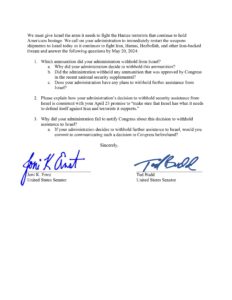The U.S. paused a shipment of bombs to Israel last week over concerns that Israel was approaching a decision on launching a full-scale assault on the southern Gaza city of Rafah against the wishes of the U.S., a senior administration official said Tuesday.
The shipment was supposed to consist of 1,800 2,000-pound (900-kilogram) bombs and 1,700 500-pound (225-kilogram) bombs, according to the official, who spoke on the condition of anonymity, with the focus of U.S. concern being the larger explosives and how they could be used in a dense urban setting.
It also comes as the Biden administration is due to deliver a first-of-its-kind formal verdict on whether the airstrikes on Gaza and restrictions on delivery of aid have violated international and U.S. laws – a move that the administration admitted is a result of pressure from anti-Israel political figures and groups in the Democratic party.
The Washington Free Beacon reported that the Biden administration hid its decision to pause arms sales to Israel from Congress, leading to a probe led by two GOP senators.
Senators Joni Ernst (R., Iowa) and Ted Budd (R., N.C.) sent a letter to the White House on Monday evening demanding that the administration immediately inform Congress about what types of ammunition are being withheld from Israel and why.
“We are shocked that your administration has reportedly decided to withhold critical ammunition to Israel,” the senators wrote, according to a copy of the letter obtained by the Free Beacon. “You promised your commitment to Israel was ironclad. Pausing much-needed military support to our closest Middle Eastern ally signals otherwise.”
The senators say the White House “failed to notify Congress about this decision” and expressed concern of the Biden administration’s increasingly hostile stance toward Israel.
“We must give Israel the arms it needs to fight the Hamas terrorists that continue to hold Americans hostage,” Ernst and Budd wrote. “We call on your administration to immediately restart the weapons shipments to Israel today as it continues to fight Iran, Hamas, Hezbollah, and other Iran-backed threats.”
“Which ammunition did your administration withhold from Israel?” the senators ask. “Why did your administration decide to withhold this ammunition? Did the administration withhold any ammunition that was approved by Congress in the recent national security supplemental? Does your administration have any plans to withhold further assistance from Israel?”
“On April 24, you signed the national security supplemental into law and promised that you ‘will always make sure that Israel has what it needs to defend itself against Iran and terrorists it supports,’” the senators wrote. “If these reports are true, then you have once again broken your promise to an American ally.”
Ernst and Budd are requesting the Biden administration explain how its “decision to withhold security assistance from Israel is consistent” with previous statements promising unconditional military assistance.
“Why did your administration fail to notify Congress about this decision to withhold assistance to Israel?” they ask. “If your administration decides to withhold further assistance to Israel, would you commit to communicating such a decision to Congress beforehand?”
U.S. officials had declined for days to comment on the halted transfer, word of which came as Biden on Tuesday described U.S. support for Israel as “ironclad, even when we disagree.”
Press secretary Karine Jean-Pierre declined to square the arms holdup with Biden’s rhetoric in support of Israel, saying only, “Two things could be true.”
Just last month, Congress passed a $95 billion national security bill that included funding for Ukraine, Israel and other allies. The package included more than $14 billion in military aid for Israel, though the stalled transfer was not related to that measure.
The State Department is separately considering whether to approve the continued transfer of Joint Direct Attack Munition kits, which place precision guidance systems onto bombs, to Israel, but the review didn’t pertain to imminent shipments.
The U.S.-Israel relationship has been close through both Democratic and Republican administrations. But there have been other moments of deep tension since the founding in which U.S. leaders have threatened to hold up aid in attempt to sway Israeli leadership.
President Dwight Eisenhower pressured Israel with the threat of sanctions into withdrawing from the Sinai in 1957 in the midst of the Suez Crisis. Ronald Reagan delayed the delivery of F16 fighter jets to Israel at a time of escalating violence in the Middle East. President George H.W. Bush held up $10 billion in loan guarantees to force the cessation of Israeli settlement activity in the occupied territories.


(YWN Israel Desk – Jerusalem & AP)












4 Responses
Remember when trump tried to withhold arms to Ukraine
Only then was it impeachable
Riiight
Congress approved the arms deal and the Executive Branch is not allowed to stop it. The House should impeach FJB for this.
don’t wait til values go down in the USA and they pass laws that you can’t take your money overseas. Now is the time 🇮🇱 🇮🇱
1,000,000 jews to 🇮🇱 , here’s the Math.
25,000 dollars tax revenue plus 25,000 dollars per year Ma’am revenue per jew to israel instead of uncle JoeBiden hamas supporter….
50,000 x 1,000,000 = 50,000,000,000
that’s 50 billion dollars a year in tax revenue to 🇮🇱 instead of Biden.
not to mention you can walk around with a kippah on your head Proudly
wake up and smell the coffee. life’s not just about making moolah. let’s go Yidden
if you’re going to do a historic recap, do it right!
first, the united snakes refused entry to jewish refugees in ww2. and then, in 1948, it imposed an arms embargo on sales to israel. (only lifted after the 1967 war!) on top of that, henry kissinger delayed resupply in the midst of the 1973 war, to “pressure” israel. and obama held up shipments of both hellfire missiles and bunker buster bombs (which he later shipped, albeit with defective fuses.)
america has ALWAYS attached strings to arms sales to israel, which is why israel must work harder to build up its domestic supply chain.